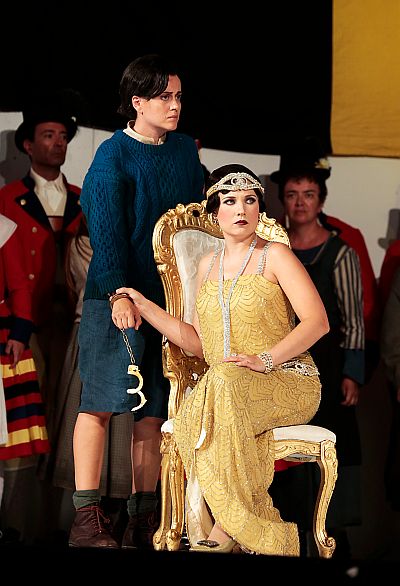 Italy ROF (3) Rossini, Guillaume Tell. Chorus and Orchestra of Teatro Comunale di Bologna. Conductor, Michele Mariotti. Chorus Master, Andrea Faidutti. Stage Director, Graham Vick. Sets and Costumes, Paul Brown. Choreography, Ron Howell. Lighting, Giuseppe di Iorio 17.08-2013 (JB)
Italy ROF (3) Rossini, Guillaume Tell. Chorus and Orchestra of Teatro Comunale di Bologna. Conductor, Michele Mariotti. Chorus Master, Andrea Faidutti. Stage Director, Graham Vick. Sets and Costumes, Paul Brown. Choreography, Ron Howell. Lighting, Giuseppe di Iorio 17.08-2013 (JB)

Amanda Forsyth (Jemmy) standing and Marina Rebeka (Mathilde) seated.
credits: studio amati bacciardi
Cast:
Guillaume Tell –Nicola Alaimo
Arnold Melcthal -Juan Diego Florez
Walter Furst –Sion Orfila
Melcthal –Simone Alberghini
Jemmy (Guillaume’s son) –Amanda Forsythe
Gesler –Luca Tittoto
Mathilde –Marina Rebeka
Stop Press first. Juan Diego Florez has just sung his first Arnold in Guillaume Tell at the Rossini Opera Festival in Pesaro. Everyone wants to know how he delivered himself of the misleadingly termed, chest high Cs in the final cabaletta. The short answer is -like he delivers himself of everything else: rather easily. Two wonders lie at the roots of the Florez art. The first is the most magnificent physiological makeup of his voice. The second is the immaculate technique which services his natural gift. And it is an ever expanding technique. The voice tonight sounds much bigger than it has ever done. But the mechanisms are well oiled. The support is just as solid as it always was. And just as relaxed. A bigger voice, yes. But the song remains as natural as breathing in its delivery. I have no doubt that he could sing Tristan if he chose to. But I rather hope he won’t.
You will recall how he is cheeky enough to encore the show-stopper in La Fille du Régiment. From the ovation which followed Asile héréditaire (with its more powerful top Cs) he seemed to be in danger of encore again. He wisely resisted.
The unsurpassed beauty of his legato was put to admirable use in his expressive declaration of love for Mathilde in Act 1. Love pours out of him as a seeming natural expression of his person.
The same, alas, cannot be said for her. She sang Sombre forét rather well, though I did immediately notice a metallic quality to her voice which does nothing to convince us she is a lover as well as a princess. Marina Rebeka is a handsome woman with a fine, regal bearing –all admirable features of a princess. But dear, O dear, she has no sooner got her declaration of love off her chest than the man himself arrives, with love pouring out of him for the duet. She ups the stakes, which means upping the metallic quality of the voice, which in turn does terrible things to the intonation. This forcing quickly became squawking and lasted for the rest of the evening. Hell! But take no notice of me. The Pesaro audience loved her.
Armanda Forsythe has the perfect, slender, slight physique and the most pure, lyrically focused, light soprano voice, all which make her the ideal Jemmy, Guillaume’s son. Her aria, just ahead of the apple-shooting episode, Sois immobile, et vers la terre, was one of the evening’s great highlights. And I like to think that I was leading the thunderous applause it received.
Guillaume is a bumbling character in Rossini’s creation. And Nicola Alaimo bumbled through it rather well –always with the right touch of pathos in his delivery.

credits: studio amati bacciardi
Italians support their conductors like their football teams, so the greatest ovation of the evening was reserved for Michele Mariotti, a home-grown product in the strict sense of that term. The music became flesh and dwelt among us, so to speak. Michele’s father, Gianfranco Mariotti, was the town’s leading gynaecologist, as well as Cultural Officer and founder, and today, Sovrintendente, of the Rossini Opera Festival. Michele is also the chief conductor of the Orchestra of the Bologna Teatro Comunale (where he followed Chailly and Gatti), who were in the pit. He has an immediacy of communication with his players as well as a busy, deserved, international reputation.
He rose to the Tell challenge superbly. Immaculate rhythm and bristling vitality. I understand that Mr Johnny Depp is the latest to have thrown up some on-screen dust to the strains of the Tyrolean gallop which closes the overture. Equally arresting was Mariotti’s handling of the tender lyrical moments such as the four solo cellos which open the overture or the mores expressive moments of the two ballet scenes.
Those two scenes are often cut with the charge that their music is inconsequential. But that is to miss their considerable charm, which Maestro Mariotti had thoroughly grasped and realised. Ron Bowell’s choreography worked beautifully in the third act ballet where the composer carefully distinguishes between the Tyrolean folkdances, contrasted with the Austrian court dance. A word of praise for Paul Brown’s festive costumes for this scene. In Act 1’s ballet I was not alone in finding Mr Bowell’s choreography somewhat confused –unsure of which of the two traditions he should be following.
Tell is arguably Rossini’s political opera, a matter which has not escaped the attention of Graham Vick, who makes the Austrian rulers of the Swiss the chief villains of the tale. Immense long clean lines were the effective hallmark of Paul Brown’s all-white set. I felt somewhat uncomfortable in some of the sadism on display in Act 3’s ballet, but recognised that it was intended that I should feel this. It brought to mind Per Paolo Passolini’s nearly unwatchable film, 120 Days of Sodom. When I asked PPP what the hell he thought he was up to in this film he smiled wryly and admitted he didn’t really know.
Television cameras, looking like prehistoric monsters, were electronically adjusted as they ate up the show. The press office tell me the DVD should be available soon.
Jack Buckley